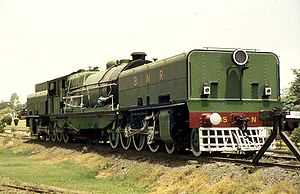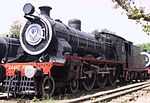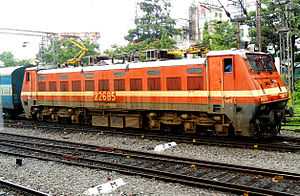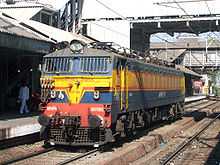BNR class N
| BNR class N |
|---|
|

Preserved unit at National Rail Museum, Delhi |
| Type and origin |
|---|
| Power type |
Steam |
|---|
| Builder |
Beyer, Peacock & Co. |
|---|
| Serial number |
6583–6598 |
|---|
| Build date |
1929 |
|---|
| Total produced |
16 |
|---|
| Specifications |
|---|
| Configuration |
4-8-0+0-8-4 |
|---|
| UIC classification |
(2′D)(D2′) h4t |
|---|
| Gauge |
5 ft 6 in (1,676 mm) |
|---|
| Driver diameter |
4 ft 8 in (1.422 m) |
|---|
| Axle load |
20.25 long tons (20.57 t) |
|---|
| Weight on drivers |
159.4 long tons (162.0 t) |
|---|
| Locomotive weight |
234 long tons (238 t) |
|---|
| Fuel type |
Coal |
|---|
| Fuel capacity |
14 long tons (14 t) |
|---|
| Water capacity |
10,000 imp gal (45,000 l; 12,000 US gal) |
|---|
| Boiler pressure |
210 psi (1.45 MPa) |
|---|
| Firegrate area |
69.8 sq ft (6.48 m2) |
|---|
| Superheater area |
642 sq ft (59.6 m2) |
|---|
| Cylinders |
Four, outside |
|---|
| Cylinder size |
20 1⁄2 in × 26 in (521 mm × 660 mm) |
|---|
| Valve gear |
Rotary cam poppet and Caprotti |
|---|
| Valve type |
Piston valves |
|---|
| Performance figures |
|---|
| Maximum speed |
45 mph (72 km/h) |
|---|
| Tractive effort |
69,655 lbf (309.84 kN) |
|---|
| Career |
|---|
| Operator(s) |
|
|---|
| Number(s) |
- BNR: 810–825
- →IR: 38810–38825
|
|---|
| Locale |
South Eastern Railway zone |
|---|
| First run |
1929 |
|---|
| Last run |
1970 |
|---|
| Retired |
1970 |
|---|
| Withdrawn |
1970 |
|---|
| Preserved |
No. 811 and 815 |
|---|
| Current owner |
National Rail Museum, Delhi and Kharagpur Workshops |
|---|
| Disposition |
Withdrawn |
|---|
The Bengal Nagpur Railway class N Garratt were the ones having largest water capacity of any Garratt. The largest locomotives in India. With the success of HSG, this class followed. Due to their heavy weight, they were restricted to 90 lb/yard rails. They had straight-ported cylinders. It is not known if this suited them for hauling slow, heavy coal traffic. Like HSG, they were used Chakradharpur-Jharsuguda and also at Anara-Tatanagar sections. After electrification, they were used at Rourkela. They could haul 2400 tonnes on a 1 in 100 gradient.[1]
Technical specifications
| Boiler diameter | 7 ft 1 13⁄16 in (2.18 m) |
| Boiler area | 3,112 sq ft (289.1 m2) |
| Max Train load | 3,000 long tons (3,000 t) |
See also
References
|
|---|
| | Steam | BESA designs | |
|---|
| IRS designs | |
|---|
| World War II designs | |
|---|
| IGR standard designs | |
|---|
| |
|---|
| | Diesel | | |
|---|
| Passenger | |
|---|
| Goods |
- WDG 2/3A
- WDG 3B, WDG 3C, WDG 3D
- WDG 4
- WDG 5
|
|---|
| Shunting |
- WDS 1
- WDS 2
- WDS 3/4C
- WDS 4, WDS 4A, WDS 4B, WDS 4D
- WDS 4C
- WDS 5
- WDS 6
- WDS 8
|
|---|
|
|---|
| | DC electric | Mixed type |
- WCM 1
- WCM 2
- WCM 3
- WCM 4
- WCM 5
- WCM 6
|
|---|
| Passenger |
- WCP 1, WCP 2
- WCP 3, WCP 4
|
|---|
| Goods | |
|---|
|
|---|
| | AC electric | Mixed type | |
|---|
| Passenger | |
|---|
| |
- WAG 1
- WAG 2
- WAG 3
- WAG 4
- WAG 5
- WAG 5A, WAG 5B
- WAG 6A
- WAG 6B, WAG 6c
- WAG 7
- WAG 9
|
|---|
|
|---|
| | Dual (AC and DC) electric | |
|---|
|




